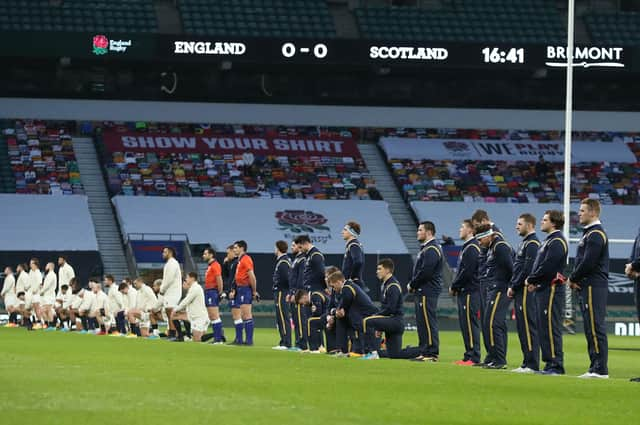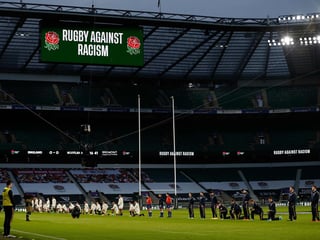Scotland rugby team kneeling row shows there is no room for nuance in the court of public opinion – Martyn McLaughlin


The discourse around the incident speaks to the inherent danger of making sweeping assumptions about the meaning of the actions of those players who remained on two feet. Over the past 72 hours, I have read of how they “failed” to take the knee, or even more bluntly, “refused” to.
The inference of this oppositional language, whether accidental or deliberate, is that the players in question have no empathy with a cause greater than themselves, or worse still, that they have elected to take a stand against it.
Advertisement
Hide AdAdvertisement
Hide AdOne account on Twitter with upwards of 10,000 followers was unequivocal in its perception of events at Twickenham. “They chose racism,” it concluded.
Such simplistic hot takes shepherd us into dangerous territory. All of us are entitled to disapprove of the fact some players did not take the knee, but no one should feel so emboldened by their opprobrium as to casually fling around accusations of bigotry.
‘A polarising argument’
In the aftermath of the match, one of the players who remained standing, Jamie Ritchie, said that it was an act of “quiet reflection” which supported the anti-racism movement. He explained how his teammates who got on one knee supported his choice, and he, in turn, supported theirs.
“You can’t please everyone,” Ritchie acknowledged. “It’s such a polarising argument, whether to kneel or not.”
Ritchie is not the first athlete who felt obliged to justify why he did not kneel, nor will be the last. The same indignation and accusations of complicity greeted Jonathan Isaac last year when he was the only NBA player who stood during demonstrations against racial injustice. As a young man of faith as well as colour, he felt more comfortable praying for change than kneeling for it.
It was not enough to pacify those enraged by his decision to choose conscience over conformity; when Isaac injured his knee shortly afterwards, a gloating chorus of idiots viewed it as karma. In the court of public opinion, nuance is inadmissible.
In both instances, the controversy burned thanks to the oxygen of social media, whose wardens pay unwavering attention not just to what is uttered, but that which goes unsaid. Increasingly, any public figure, organisation, or company which does not express unity with a popular sentiment or belief is automatically adjudged to stand in opposition to it.
Poppy shaming
These pile-ons began in earnest with poppy shaming, an alternative annual tradition punctuated by screenshots of bare lapels and annotated outrage, although their genesis could to be traced back further: to the singing of national anthems, perhaps, or even the death of Princess Diana, a tragedy-cum-psychosis in which the entire country fell under a three-line whip of declarative grief.
Advertisement
Hide AdAdvertisement
Hide AdThis insistence on binary public declarations has been mutated and amplified by online platforms which have commodified social consciousness into social capital. It is absurd and overwhelming, and it serves to undermine causes that are worth fighting for.
This is particularly true in sport, an arena in which the Black Lives Matter has gained significant momentum and visibility. This is obviously excellent, but is it not time to start asking: to what end? If our response to flashpoints such as the Twickenham episode focuses on gestures at the expense of the change they demand, we risk inviting sporting authorities to treat anti-racism initiatives as performative exercises.
The harsh reality is that while many in the upper echelons of elite sport regard the Black Lives Matter movement as a sudden awakening, it has merely given voice to emotions and issues that have been met with silence, if not hostility, for decades. It is those authorities who bear a responsibility to evolve the debate and bring about substantive progress, measurable by clearly defined metrics.
Working towards better representation would be a positive first step. The most recent research by sportscotland into coaches of sports clubs found that 95 per cent identified as white, as did 96 per cent of those clubs’ members.
Lasting change
Some sports, of course, are more proactive than others, and given Scottish Rugby’s recent statement which supported the ongoing work to end discrimination and racism, it seems only fair to ask questions of it.
Some seven years have passed since the governing body published its inaugural equality action plan, a document superseded three years later by a revised 19-page strategy. It includes many admirable ambitions, such as increasing access to rugby for under-represented groups, and better understanding the barriers they face.
Unfortunately, nearly two-and-a-half years have now passed since its last update in the second quarter of 2018, which made for less than inspiring reading. It noted that work had yet to begin on participatory programmes targeting ethnic minorities, as had specific studies into participation rates within Asian and Muslim communities.
It may be that progress has been made towards these goals, and it has simply not been recorded. If so, fantastic, let’s push for more. Let’s ask about educational programmes, data on diversity, and inclusiveness at managerial and executive levels. Let’s demand answers on grassroots investment and the culture of governance. Let’s look under the bonnet of the public statements and see what work is being carried out.
Advertisement
Hide AdAdvertisement
Hide AdThese are awkward and uncomfortable conversations to have, and well they should be. It is easy to join the circular debate around kneeling and pretend that is enough to earn your place on the right side of history. It is much harder to envision what lasting change looks like, and how to play your part in ensuring that future arrives sooner rather than later.
A message from the editor:
Thank you for reading this article. We're more reliant on your support than ever as the shift in consumer habits brought about by coronavirus impacts our advertisers. If you haven't already, please consider supporting our trusted, fact-checked journalism by taking out a digital subscription.
Comments
Want to join the conversation? Please or to comment on this article.
